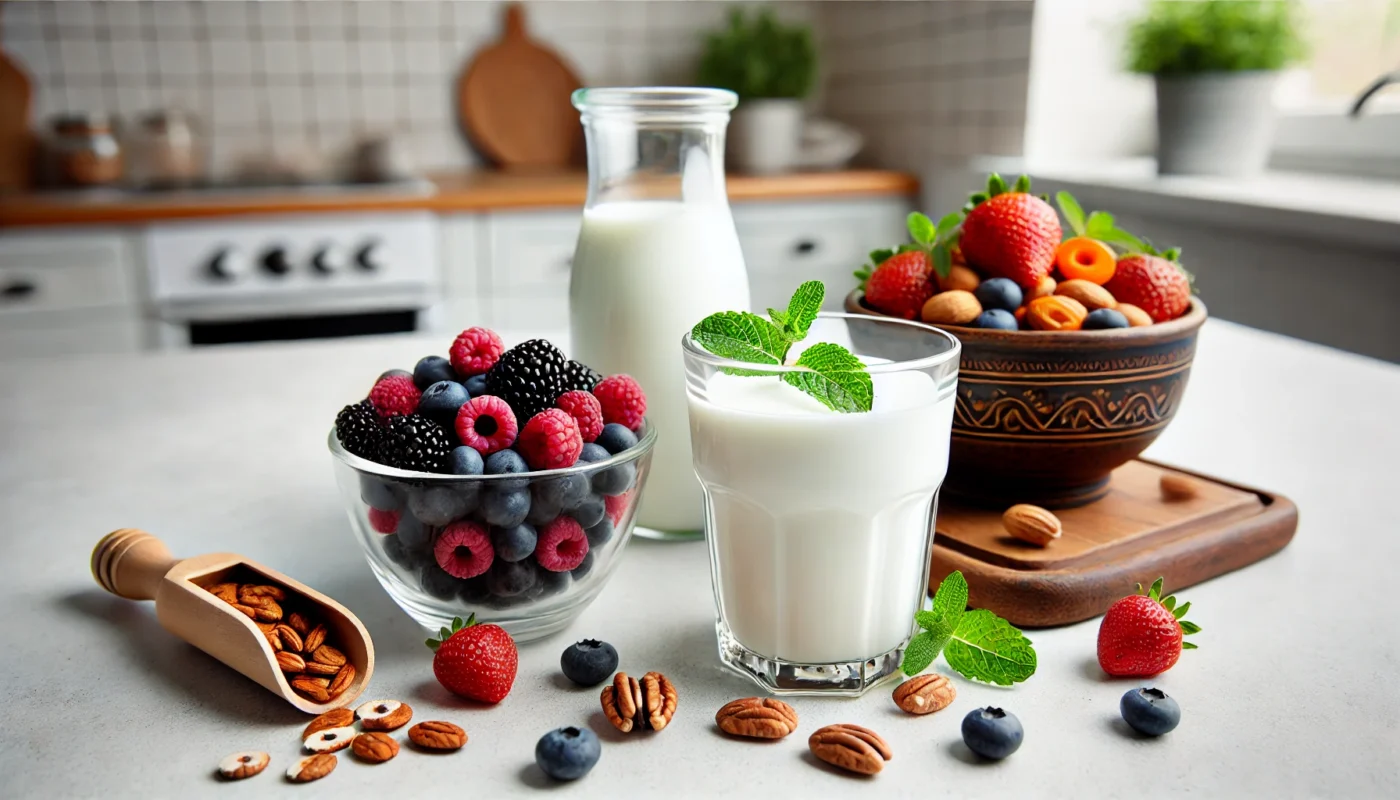Hypertension, or high blood pressure, is one of the leading causes of cardiovascular disease worldwide, affecting over 1.28 billion adults, according to the World Health Organization (WHO). While factors like diet, physical activity, and stress are well-established contributors to hypertension, an emerging area of interest is the role of gut health. The gut microbiome—an ecosystem of trillions of microorganisms—plays a vital role in regulating various aspects of health, including blood pressure. Probiotics, live beneficial bacteria found in certain foods and supplements, are increasingly recognized for their potential to manage hypertension.
This article explores the connection between gut health and blood pressure, the mechanisms through which probiotics influence cardiovascular health, the best probiotic foods to incorporate into a heart-healthy diet, and the role of nutritional supplements in managing hypertension.
You May Also Like: Hypertension and Intermittent Fasting: Does It Help?
Understanding the Gut-Blood Pressure Connection
The gut microbiome consists of a diverse community of microorganisms, including bacteria, fungi, and viruses, that live in the digestive tract. These microorganisms influence a wide range of bodily functions, from digestion to immune response and even cardiovascular health.
1. Gut Microbiome Dysbiosis and Hypertension
An imbalance in gut microbiota, known as dysbiosis, is associated with inflammation, impaired metabolism, and increased blood pressure. Dysbiosis can result from factors such as poor diet, stress, and antibiotic use, disrupting the delicate balance of beneficial and harmful bacteria in the gut.
- Evidence: A study published in Hypertension Research (2017) found that individuals with high blood pressure had a significantly different gut microbiota composition compared to normotensive individuals, with reduced levels of beneficial bacteria like Lactobacillus and Bifidobacterium.
2. Short-Chain Fatty Acids (SCFAs)
Beneficial gut bacteria ferment dietary fiber to produce short-chain fatty acids (SCFAs) like butyrate, acetate, and propionate. SCFAs play a crucial role in maintaining vascular health by reducing inflammation, relaxing blood vessels, and improving insulin sensitivity.
- Evidence: Research in Nature Communications (2020) demonstrated that higher levels of SCFAs were associated with improved endothelial function and lower blood pressure.
3. Gut-Brain Axis
The gut communicates with the brain via the gut-brain axis, influencing stress responses and autonomic nervous system regulation. Dysbiosis can amplify stress-related blood pressure spikes, while probiotics may help modulate this connection.

How Probiotics Lower Blood Pressure
Probiotics are live microorganisms that, when consumed in adequate amounts, confer health benefits. Their role in managing hypertension involves multiple mechanisms.
1. Reduction of Inflammation
Probiotics help restore gut microbiota balance, reducing systemic inflammation—a known driver of hypertension. They increase the production of anti-inflammatory cytokines while suppressing pro-inflammatory markers.
- Evidence: A clinical trial published in Clinical Nutrition (2019) found that individuals taking probiotics experienced a significant reduction in inflammatory markers and a 4 mmHg decrease in systolic blood pressure (SBP).
2. Regulation of Lipid Profiles
Certain probiotic strains, such as Lactobacillus plantarum, have been shown to lower LDL cholesterol and improve overall lipid profiles. Healthier cholesterol levels reduce arterial stiffness and enhance vascular function.
- Evidence: A study in The Journal of Clinical Hypertension (2020) showed that probiotics reduced LDL cholesterol by 5% and lowered diastolic blood pressure (DBP) by 3 mmHg.
3. Enhanced Nitric Oxide Production
Probiotics promote the production of nitric oxide, a molecule essential for relaxing blood vessels and improving blood flow.
- Evidence: Research in Hypertension Research (2018) demonstrated that probiotic supplementation increased nitric oxide availability, leading to improved vascular relaxation and blood pressure control.

Best Probiotic Foods for Hypertension Management
Incorporating probiotic-rich foods into your diet is a natural way to support gut health and potentially lower blood pressure. Here are some of the best options:
1. Yogurt
Yogurt is one of the most popular sources of probiotics, particularly strains like Lactobacillus and Bifidobacterium. Choose plain, unsweetened yogurt with live and active cultures for the greatest health benefits.
- Tip: Greek yogurt is a high-protein option that pairs well with fruits, nuts, or granola for a nutrient-dense snack.
2. Kefir
Kefir is a fermented milk drink containing a diverse range of probiotics. Its tangy flavor and creamy texture make it a versatile addition to smoothies or dressings.
- Evidence: A study in Nutrition Journal (2017) found that kefir consumption reduced SBP by 5 mmHg in hypertensive participants over a 12-week period.
3. Kimchi
Kimchi, a traditional Korean dish made from fermented vegetables, combines probiotics with antioxidants and anti-inflammatory compounds. Its spicy and flavorful profile makes it a versatile addition to meals.
- Evidence: Research in The Journal of Functional Foods (2020) showed that kimchi consumption improved gut microbiota diversity and lowered blood pressure in individuals with prehypertension.
4. Sauerkraut
Sauerkraut is made from fermented cabbage and is rich in both probiotics and dietary fiber, which further supports gut health.
- Tip: Look for raw, unpasteurized sauerkraut, as pasteurization can kill beneficial bacteria.
5. Miso
Miso, a fermented soybean paste, is a staple in Japanese cuisine. It is not only a source of probiotics but also provides essential nutrients like potassium and magnesium, which help regulate blood pressure.
- Caution: Due to its high sodium content, consume miso in moderation and opt for low-sodium varieties when possible.
6. Tempeh
Tempeh is a fermented soybean product that offers probiotics along with plant-based protein and is an excellent addition to vegetarian or vegan diets.

The Role of Nutritional Supplements in Hypertension Management
In addition to probiotics, certain nutritional supplements have shown promise in supporting blood pressure regulation. Here are five supplements with evidence-based benefits:
1. Magnesium Glycinate
Magnesium is vital for blood vessel relaxation and reducing vascular resistance. A study in Magnesium Research (2016) reported that magnesium supplementation reduced SBP by 5 mmHg.
2. Omega-3 Fatty Acids
Omega-3s, found in fish oil, help reduce inflammation and improve arterial health. A meta-analysis in Hypertension (2018) showed a 4 mmHg reduction in SBP with omega-3 supplementation.
3. Hibiscus Extract
Hibiscus promotes nitric oxide production and vascular relaxation. The Journal of Nutrition (2010) reported a 6 mmHg reduction in SBP with daily hibiscus tea consumption.
4. Coenzyme Q10 (CoQ10)
CoQ10 is a powerful antioxidant that reduces oxidative stress and improves endothelial function. A clinical trial in Hypertension Research (2007) demonstrated that CoQ10 supplementation lowered SBP by 11 mmHg.
5. Beetroot Powder
Beetroot is rich in nitrates, which improve blood flow and reduce arterial stiffness. A study in Nutrition Journal (2017) found that beetroot supplementation reduced SBP by 4 mmHg.

Conclusion
The connection between gut health and hypertension highlights the importance of probiotics as part of a comprehensive strategy for managing blood pressure. Whether consumed through fermented foods like yogurt, kimchi, and kefir or as supplements, probiotics offer a natural way to improve gut microbiota balance, reduce inflammation, and support cardiovascular health. Combined with other proven strategies, such as consuming heart-healthy supplements, regular exercise, and stress management, probiotics provide a powerful tool for better blood pressure control and overall well-being. Embracing a gut-friendly lifestyle is an investment in long-term heart health.
References
- Hypertension Research. (2017). Gut microbiota composition in hypertensive individuals. Hypertension Research. Retrieved from https://www.nature.com/hr
- Nature Communications. (2020). Short-chain fatty acids and vascular health. Nature Communications. Retrieved from https://www.nature.com
- Clinical Nutrition. (2019). Probiotic supplementation and blood pressure control. Clinical Nutrition. Retrieved from https://www.journals.elsevier.com
- Nutrition Journal. (2017). Effects of kefir consumption on hypertension. Nutrition Journal. Retrieved from https://www.biomedcentral.com
- The Journal of Functional Foods. (2020). Kimchi consumption and blood pressure reduction. The Journal of Functional Foods. Retrieved from https://www.sciencedirect.com
Key TERMS for this article:
Hypertension, Probiotics, Gut Microbiome, Blood Pressure Regulation, Fermented Foods, Nitric Oxide, Inflammation
Relevant and useful TAGS for this article:
Hypertension Management, Gut Health, Probiotic Foods, Blood Pressure Control, Fermented Foods, Cardiovascular Health, Inflammation Reduction, Nitric Oxide, Nutritional Supplements, Heart Health
Important Note: The information contained in this article is for general informational purposes only, and should not be construed as health or medical advice, nor is it intended to diagnose, prevent, treat, or cure any disease or health condition. Before embarking on any diet, fitness regimen, or program of nutritional supplementation, it is advisable to consult your healthcare professional in order to determine its safety and probable efficacy in terms of your individual state of health.
Regarding Nutritional Supplements Or Other Non-Prescription Health Products: If any nutritional supplements or other non-prescription health products are mentioned in the foregoing article, any claims or statements made about them have not been evaluated by the U.S. Food and Drug Administration, and such nutritional supplements or other health products are not intended to diagnose, treat, cure, or prevent any disease.

